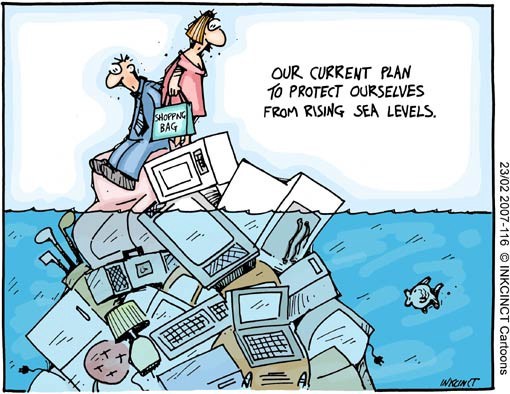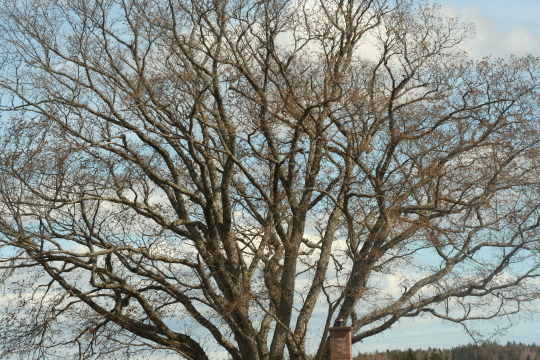Text
Thoughts on Consumerism and the Effects of Direct and Indirect Messaging on our Purchasing

As I continue my blogging journey, and the course I am currently engaged in, I thought I would look at ecopoetry as it relates to consumerism. So many people are unaware, or perhaps blindly ignorant, of the negative effects of consumerism. We live in online world, where the purchase of something is literally a click away. In a physical sense, a purchase is just a tap away. We have easier access to our money via debit, credit, gift cards, and phones, than we ever had before. But, how much time do we spend thinking about our purchasing habits? Do we think about the necessity of the purchase beforehand? Do we think about the environmental impact of the purchase? Is it recyclable, biodegradable, made from fossil fuels? What will happen to it after you discard it?
As a child, I thought very little of where our garbage went, or how something was made. As I got older, and environmental issues were becoming more prevalent, I found myself thinking more and more about the impact of my purchases. At the same time, with a little extra cash in hand, I also found myself looking through flyers, trying to find something I absolutely needed to our home, to justify that extra purchase. The more flyers that came, the more I felt I needed to purchase the fancy watch, the new coffee maker, the latest fashions, and cool new gadgets. Television sold us the good life several times per hour in the form of commercials. Society was being told what success looked like through direct and indirect messages. Whether it was a commercial for a particular product, or a strategically placed item in a tv show or movie, messages were designed to convince consumers to buy.
Now, direct and indirect messages that sell the good life are everywhere. As soon as you look something up online you are inundated with text messages, emails, and flyers, trying to convince you to sign up, purchase, or subscribe. It is so easy to fall victim to over consumption when companies inundate you with messaging everywhere you go.
We live in a society where success is measured by how much you own, where you can travel, and how many home renos you can do. Mass consumerism is literally destroying our earth. Products that have been used up and discarded 10, 20, sometimes 30 years ago, continue to sit in our landfills, and float in our waterways. How do we teach our society that part of the success of our planet depends on a massive decrease in consumer goods, especially when this is the very thing we base our success on?
I have made plenty of purchases based solely on the messaging I received. I bought an inflatable pool 2 years ago because it was on sale. It is still sitting outside on the ground, never filled, with mice holes bitten into it. I now use it in my yard to cover weeds I am trying to get rid of. I purchased workout machines that have rarely been used, printers I ditched once the ink was too expensive, and a cool frying pan that I didn't need, but the color matched my kitchen walls. The point is, even those of us who try hard to be environmentally conscious, still make mistakes. We are not perfect.
In this portion of the blog, I would like to introduce some poems from the site https://www.poemhunter.com/ related to consumerism. My hope is that these poems will make you think about your choices, and perhaps, make more eco-friendly decisions. Together, we can make an impact.
Ross DixPeek:
Michael Sheppard:
John Knight:
Aniruddha Pathak:
Reference List
Feature: Sea level rise: ‘regardless of mitigation, we will have to
adapt’ (2010) Sydney Green Sheet. Available at:
https://sydneygreensheet.wordpress.com/2010/11/23/feature-
sea-level-rise-regardless-of-mitigation-we-will-have-to-adapt/
(Accessed: 29 October 2023).
Poem Hunter: Poems - poets - poetry (no date) PoemHunter.com.
Available at: https://www.poemhunter.com/ (Accessed: 29
October 2023).
0 notes
Text

My Old Tree
My old tree
That Fiona beat
Branches lay down at her feet
Her roots were strong,
her branches not
It no longer looks like the home we bought.
0 notes
Text
Teaching Current Events in the Classroom Through Ecopoetry
Last week, my students spent time viewing weather reports, watching projections and talking about Hurricane Lee. After gauging their interest in the hurricane, I decided to use short lessons that allowed them to steer the conversation. They used their experience with post tropical storm Fiona in 2022 to engage in the daily lessons. Most of my students are not yet 10, but their conversations and insights told me it is an area of interest, or perhaps concern, for them.
What can Adora Svitak teach us?
I have always felt it was important to teach current issues in an age appropriate manner. I believe students are curious about their world and want to know more about it. As a parent, I want to shelter my children from some of the harsh realities, but I also know the importance of teaching them the truth. Young educational activist Adora Svitak said:
"By bringing current events into the classroom, everyday discussion, and social media, maybe we don't need to wait for our grandchildren's questions to remind us we should have paid more attention to current events."
Adora Svitak https://www.brainyquote.com/quotes/adora_svitak_594720
Adora Svitak and Paulo Freire: What is the connection?
This young activist reminds me of Paulo Freire. Freire believed that teaching adult learners to read would help them see their own oppression. This knowledge could then transform their lives through action. Teaching current events in the classroom, can do the same. Elizabeth Lange, in her 2023 book Transformative Sustainability Education, stated that Freire’s:
"literacy process was called conscientization as adult learners become conscious of the root causes of their oppression and then took collective action to improve their lives"
(Lange, 2023, pg. 76).
This is similar to Svitak's belief that children need to understand current events, so they can begin their work toward change. To learn more about Paulo Freire’s theory of education, watch the following video.
youtube
An informative academic article regarding Freire's transformative learning theory can be found here:
The Ecopoetry Connection
One major current issue that faces children globally is climate change. Extreme weather events, loss of ecosystems, endangered species and species at risk, pollution, environmental disasters or social system failures are all partly the result of climate change. We need look no further than Great Thunberg to see how these issues are affecting children and young adults. Her global climate strike has mobilized millions of students throughout the world. My own students have hosted small rallies outside our school as a way to tell adults they want change. Youth do have the intelligence, willingness and creativity to take action against climate change. Young spoken word poet, Amanda Gorman, gives us a glimpse as to what youth can do:
Black eco-poets, such as Frank X Walter use their experience with oppression and resilience in his poems. Contemporary eco-poets are using their word to teach about environmental impacts to our natural world. Below is Walter's poem Love Letter to the World.
https://www.sierraclub.org/sierra/8-black-eco-poets-who-inspire-us#:~:text=%E2%80%9CEco%2Dpoetics%E2%80%9D%20%20may%20be,finding%20home%20away%20from%20home.
Edinburgh Napier University Professor Sam Illingworth states that ecopoet Elise Paschen, uses her poem The Tree Agreement, to
"promote the idea of the agency people possess in protecting and preserving their local environment. These poems discuss neighborhood resistance to tree felling and challenge our need to make a mark on the world."
Eco-poetry is more than poetry about the environment. It tells a story that is meant to expand the reader's thinking and make connections between humankind and the litany of social issues that surround their lives. As Eleanor Flowerday (2021) states,
“Eco-poetry roots you in your environment both physically but also in the way we tell stories to one another. It provides that line of connection to your surroundings that is so necessary in founding a relationship with the natural world: that feeling that you actually belong there.”
As an educator, I believe eco-poetry has a role to play in helping to transform the global climate crisis. Eco-poetry has a place in every language arts curriculum because the climate crisis effects everyone. The poets, educators and activists discussed in this blog are just a few in the every growing list of climate change activists.
Reference List
https://docs.google.com/document/d/1ImsBe97u3DMtBAbB4hj3N9Rt8ASKcpEYfYP6JJPUhZQ/edit
#ecofriendly#eco conscious#poetry#eco-poetry#environmental#teaching#eco-poetryin theclassroom#radical poetry#paulo freire#adora svatik#naturalistweekly#poetryfoundation#sierraclub#worlwildlife#Youtube
1 note
·
View note